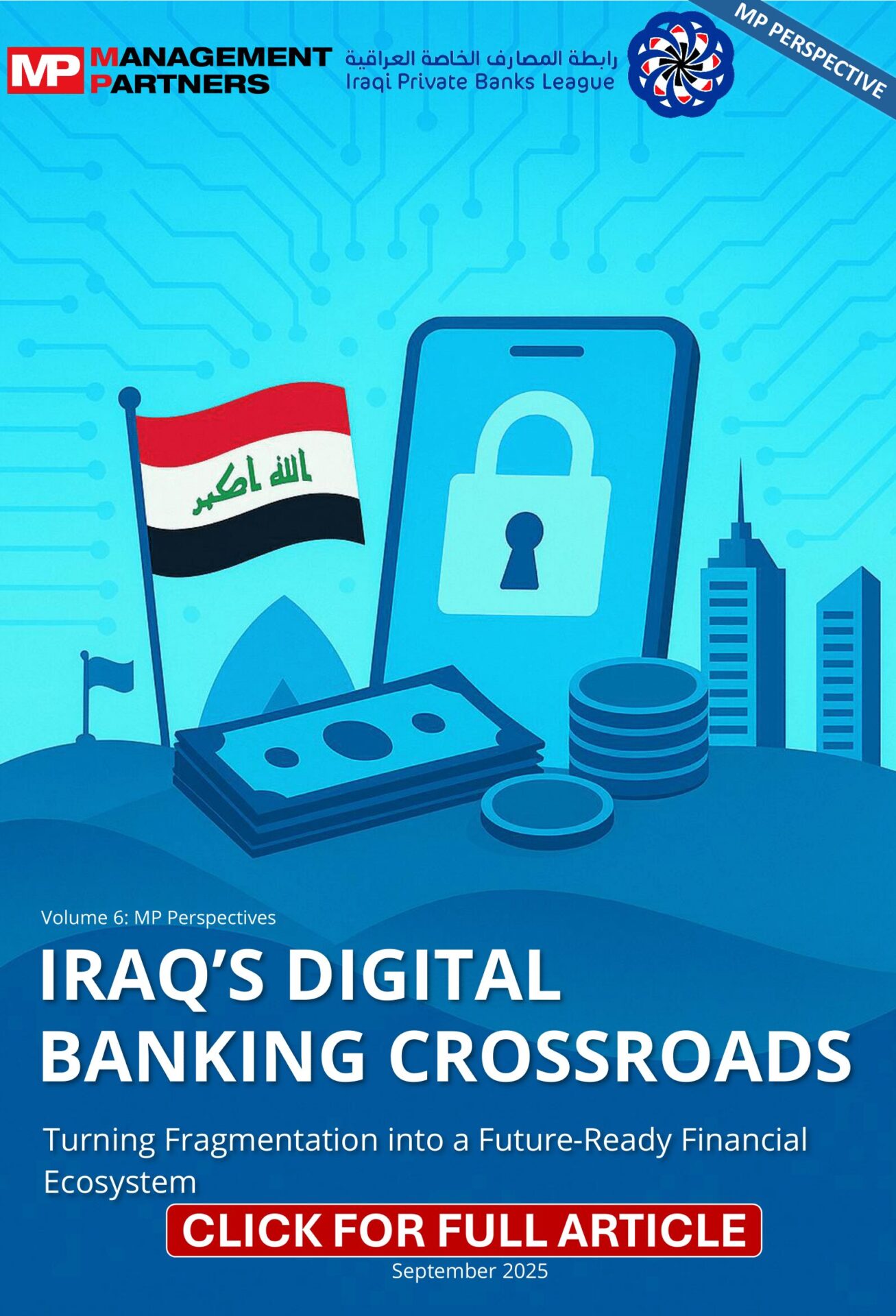Iraq’s Digital Banking Crossroads
Turning Fragmentation into a Future-Ready Financial Ecosystem
Summary of MP Perspective – September 2025
Iraq’s banking sector is moving from aspiration to execution—shifting from cash-heavy habits to a digital-first system that broadens access, lowers risk and cost, and accelerates growth. Guided by the expert reflections of Ahmed Tareq Al-Hashimi, Deputy Executive Director of the Iraqi Private Banks League and a 15+-year private-sector leader, this thought leadership piece, available for Download here: [English] OR [Arabic], explores the strategic mindset and institutional agility required to build secure, interoperable, and data-driven financial services—simple by design, resilient at scale. From digital identity and eKYC to open banking and real-time payments, it charts how banks, regulators, and fintechs can turn momentum into measurable inclusion.
Iraq’s banking sector is at a digital inflection point. A young, mobile-first population—over 60% under 25—high internet use, and rising electronic payments are reshaping expectations for speed, transparency, and security. Yet cash still dominates daily commerce and only about half of adults hold a bank account, revealing a gap between digital readiness and true financial inclusion. This is both a challenge and an opening: with relatively low branch density, Iraq can leapfrog to scalable, lower-cost digital models that meet people where they already are—on their phones.
Momentum is real. Regulators have upgraded core payment rails (RTGS, ACH, instant clearing), tested digital bank licensing, expanded point-of-sale acceptance, and strengthened compliance tooling. Leading wallets such as QiCard, ZainCash, and AsiaHawala serve millions of users, and 42 ministries now collect revenue electronically—tangible signs that infrastructure and policy can unlock nationwide adoption when aligned. The prize is a trusted, interoperable ecosystem that moves beyond pilots to daily, habitual use.
The drag is structural. Inside many institutions, onboarding still requires counters and “wet” signatures; KYC/AML checks are not fully digitized; core systems are fragmented; and links to national registries are weak. These frictions push supposedly digital journeys back to paper, increasing costs and eroding trust for consumers, merchants, and SMEs. Without interoperability and consistent standards, each new solution adds complexity rather than compounding value.
The path forward is to digitize from the inside out and design around real economic workflows. Biometric eKYC, AI-assisted AML, digital document management, and cloud-ready cores convert compliance into real-time, auditable processes while lowering unit costs. With the foundation in place, banks and fintechs can embed finance where people already transact: e-invoicing tied to tax filing, inventory-linked credit for merchants, embedded payments for utilities and municipal services, and offline-capable agent channels that extend reach to rural communities.
Government’s role must evolve from policy setter to platform co-designer. Legal recognition of digital identity and e-signatures, API-enabled registries, and end-to-end digital public services ensure citizens never have to reprint a “digital” receipt. A dedicated, budgeted transformation authority can set technical standards, enforce interoperability across ministries and markets, and coordinate a tiered cybersecurity regime that matches investment to institutional risk and protects consumers as volumes scale.
With these foundations, digital banks become engines of inclusion. Biometric onboarding can expand access quickly; micro-savings and micro-credit products support household resilience; merchant tools formalize income without adding friction; and open banking frameworks safely unlock data-driven credit using alternative signals. Coupled with a loan-guarantee vehicle to crowd in SME lending, these moves can convert today’s payment growth into broader economic participation and job creation.
Actionable recommendations
· Regulators: Finalize digital bank licensing; mandate open-banking APIs; launch AI/eKYC sandboxes; enforce tiered cybersecurity and consumer protection.
· Government: Legalize digital ID and e-signatures; API-enable national registries; empower a cross-ministerial digital authority; complete end-to-end e-payments for public services.
· Banks: Automate onboarding and KYC/AML; migrate to cloud-ready cores; deploy alternative-data credit scoring; co-build sector platforms for trade, utilities, and housing.
· Fintechs & Telecoms: Partner on mobile-first journeys; scale agent and offline channels; apply alternative data responsibly; strengthen dispute resolution.
· Development Partners: Co-finance digital ID and shared compliance utilities; fund capacity building; back inclusive pilots with clear impact metrics.
· Investors: Prioritize platforms with interoperability roadmaps, strong data governance, and unit economics driven by recurring digital transaction volumes.
Aligned on these priorities, Iraq can move from digitizing transactions to redesigning participation—cutting service costs, widening formal access, strengthening compliance, and positioning banks at the region’s innovation frontier. That is how a cash-centric past becomes a confidence-centric future: one platform, one partnership, one trusted interaction at a time. This is a summary. The full piece is available here for download [English] OR [Arabic]. Banking leaders, regulators, public agencies, fintech founders, and development partners: let’s scale inclusive finance together. Whether you’re focused on embedding digital identity and open banking, modernizing core operations with AI, or building sector platforms that draw the informal into the formal economy, our team is ready to support your journey. To start the conversation, please click the Contact Us button or call us directly on +971 4 3589 920.


